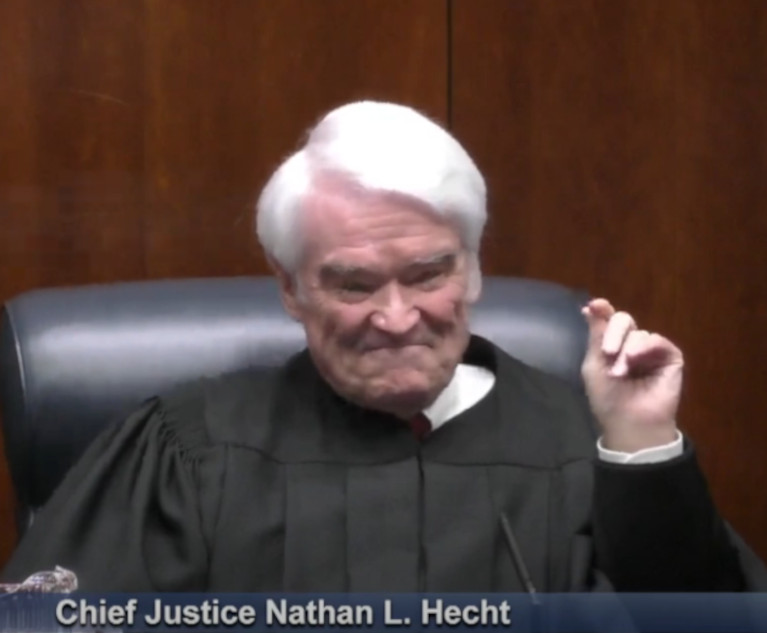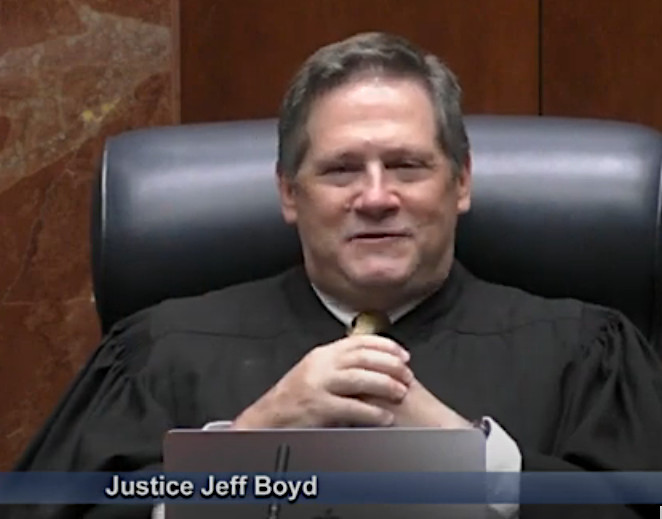 Kinney County Courthouse in Brackettville, Texas. Photo: Larry D. Moore/Wikimedia Commons
Kinney County Courthouse in Brackettville, Texas. Photo: Larry D. Moore/Wikimedia CommonsTexas Judge Accused of Pay-to-Plea Shakedown Ends System, But County Attorney Presses for Relief
Kinney County Judge Tully Shahan issued an order to end the so-called “pay to plea” system, and the county argues that this order moots a request for mandamus relief from San Antonio's Fourth Court of Appeals. Kinney County Attorney Todd Durden disagrees.
July 09, 2019 at 02:24 PM
4 minute read
A dispute between rural Kinney County's county attorney and misdemeanor judge is raging on in San Antonio's Fourth Court of Appeals over the judge's alleged use of a pay-to-plea system that forces defendants to prepay court costs and fines before they can plead guilty.
The jurist at the center of the conflict, Kinney County Judge Tully Shahan, issued a sua sponte order that ended the system critics dubbed the “Shahan Shakedown.” But County Attorney Todd Durden, who claims Shahan is the mastermind behind the prepayment system, still wants the appellate court to intervene.
The fight reached the Fourth Court in early June when Durden asked for mandamus relief to end the system, which he claimed violates due process and contravenes a 2017 Texas law that says defendants owe court costs and fees only after they're convicted.
But Kinney County argues Shahan's June 18 order resolves the dispute. Its recent filings claimed Durden's mandamus action is moot and urged the Fourth Court to dismiss it.
The county filed a motion to dismiss June 19 that noted Shahan's findings and an order one day earlier, which applied to all misdemeanor cases in which defendants had deposited funds with the county clerk before their convictions. Its motion said Shahan ordered the release of the pre-paid funds to the defendant.
“Without supporting facts, [Durden] attributes the offending policy to Judge Shahan, whose sua sponte order expressly denies such responsibility,” the motion said, claiming that county prosecutors, and not the judge, had devised the so-called pay-to-plea system.
But in a July 8 response by the state, Durden wrote that court records show that Shahan was very involved in attempts to collect prepayments of costs and fines.
“The feigned ignorance of Judge Shahan is a gross misstatement or omission of an obviously important and material fact,” said the response, which asks the Fourth Court to sanction Kinney County and its outside counsel.
Among other things, Durden claimed that Shahan's order to end the pay-to-plea system is void because the judge issued it during a time that the Fourth Court ordered a stay in the dispute. Also, the state's response said Shahan's order isn't adequate to end pay-to-plea because it does not list any procedure to ensure that all defendants who prepaid costs and fines will receive refunds.
Durden said in an interview that Shahan's order created more problems than it solved.
“His procedures only call for the clerk to refund money, so if the clerk already transferred that to the treasurer, it's not on hand and the clerk can't refund it,” Durden said.
The state argues in its response that the Fourth Court should issue mandamus relief that orders the area's local administrative judge, 63rd District Judge Henry Fernandez—who's also a respondent to Durden's mandamus case—to create new local rules of court administration to end the system for good.
In a June 25 response, Fernandez, who didn't immediately return a call seeking comment, denied any involvement in the system.
One of the real parties in interest in the mandamus action is Maria Cervantez, a low-income Bracketville woman who faced a driving-while-intoxicated charge that Fernandez dismissed while sitting as a visiting judge in Shahan's court. When Cervantez filed a motion to request the refund of $897 she had prepaid in costs and fines, Fernandez ordered only $500 refunded.
Fernandez wrote in his response that he wouldn't oppose mandamus relief that ordered him to refund the rest of Cervantez's money.
Cervantez's June 28 reply asked the Fourth Court to grant Fernandez's request. Her lawyer, Ruben Nino, didn't immediately return a call seeking comment.
Robert T. “Bob” Bass, a partner in Allison, Bass & Magee in Austin who represents Shahan and Kinney County, said he feels the court has sufficient information to decide the matter.
Bass said, “We've stated our case on why we think his pleadings are without merit.”
Related story:
This content has been archived. It is available through our partners, LexisNexis® and Bloomberg Law.
To view this content, please continue to their sites.
Not a Lexis Subscriber?
Subscribe Now
Not a Bloomberg Law Subscriber?
Subscribe Now
NOT FOR REPRINT
© 2025 ALM Global, LLC, All Rights Reserved. Request academic re-use from www.copyright.com. All other uses, submit a request to [email protected]. For more information visit Asset & Logo Licensing.
You Might Like
View All


Paxton Boasts as Texas Supreme Court Splits on Disciplining First Assistant Attorney General
4 minute read
Trending Stories
- 1Pharma Company Faces Breach-of-Contract Claim Over $1.3 Million in Unpaid Invoices
- 2KPMG Law Seeks Alternative Business License, Shaking Up Legal Status Quo
- 3Pittsburgh's Reed Smith, K&L Gates Join Fight to Save Nippon Steel-U.S. Steel Merger
- 4Milbank, Wachtell, Ropes and Pittsburgh Duo Aim to Save Nippon Steel-U.S. Steel Merger
- 5A Top Connecticut Lawyer Has Resigned
Who Got The Work
Michael G. Bongiorno, Andrew Scott Dulberg and Elizabeth E. Driscoll from Wilmer Cutler Pickering Hale and Dorr have stepped in to represent Symbotic Inc., an A.I.-enabled technology platform that focuses on increasing supply chain efficiency, and other defendants in a pending shareholder derivative lawsuit. The case, filed Oct. 2 in Massachusetts District Court by the Brown Law Firm on behalf of Stephen Austen, accuses certain officers and directors of misleading investors in regard to Symbotic's potential for margin growth by failing to disclose that the company was not equipped to timely deploy its systems or manage expenses through project delays. The case, assigned to U.S. District Judge Nathaniel M. Gorton, is 1:24-cv-12522, Austen v. Cohen et al.
Who Got The Work
Edmund Polubinski and Marie Killmond of Davis Polk & Wardwell have entered appearances for data platform software development company MongoDB and other defendants in a pending shareholder derivative lawsuit. The action, filed Oct. 7 in New York Southern District Court by the Brown Law Firm, accuses the company's directors and/or officers of falsely expressing confidence in the company’s restructuring of its sales incentive plan and downplaying the severity of decreases in its upfront commitments. The case is 1:24-cv-07594, Roy v. Ittycheria et al.
Who Got The Work
Amy O. Bruchs and Kurt F. Ellison of Michael Best & Friedrich have entered appearances for Epic Systems Corp. in a pending employment discrimination lawsuit. The suit was filed Sept. 7 in Wisconsin Western District Court by Levine Eisberner LLC and Siri & Glimstad on behalf of a project manager who claims that he was wrongfully terminated after applying for a religious exemption to the defendant's COVID-19 vaccine mandate. The case, assigned to U.S. Magistrate Judge Anita Marie Boor, is 3:24-cv-00630, Secker, Nathan v. Epic Systems Corporation.
Who Got The Work
David X. Sullivan, Thomas J. Finn and Gregory A. Hall from McCarter & English have entered appearances for Sunrun Installation Services in a pending civil rights lawsuit. The complaint was filed Sept. 4 in Connecticut District Court by attorney Robert M. Berke on behalf of former employee George Edward Steins, who was arrested and charged with employing an unregistered home improvement salesperson. The complaint alleges that had Sunrun informed the Connecticut Department of Consumer Protection that the plaintiff's employment had ended in 2017 and that he no longer held Sunrun's home improvement contractor license, he would not have been hit with charges, which were dismissed in May 2024. The case, assigned to U.S. District Judge Jeffrey A. Meyer, is 3:24-cv-01423, Steins v. Sunrun, Inc. et al.
Who Got The Work
Greenberg Traurig shareholder Joshua L. Raskin has entered an appearance for boohoo.com UK Ltd. in a pending patent infringement lawsuit. The suit, filed Sept. 3 in Texas Eastern District Court by Rozier Hardt McDonough on behalf of Alto Dynamics, asserts five patents related to an online shopping platform. The case, assigned to U.S. District Judge Rodney Gilstrap, is 2:24-cv-00719, Alto Dynamics, LLC v. boohoo.com UK Limited.
Featured Firms
Law Offices of Gary Martin Hays & Associates, P.C.
(470) 294-1674
Law Offices of Mark E. Salomone
(857) 444-6468
Smith & Hassler
(713) 739-1250






